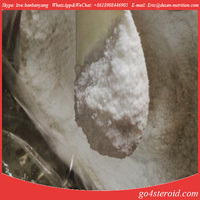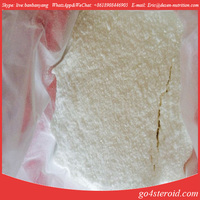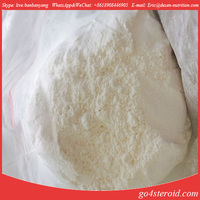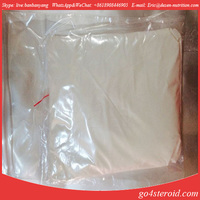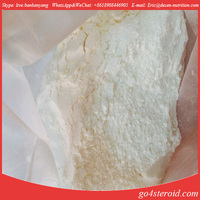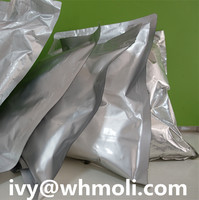L(+)-Arginine CAS 74-79-3 Nutritional enhancer
Product Quick Detail
- Place Of Origin
- China
- Minimum Order
- 1
- Packaging
- Exquisite packaging
- Delivery
- 3-7 work days
Specifications
Arginine (abbreviated as Arg or R) is an α-amino acid that is used in the biosynthesis of proteins. It is encoded by the codons CGU, CGC, CGA, CGG, AGA, and AGG.[1] It contains an α-amino group, an α-carboxylic acid group, and a side chain consisting of a 3-carbon aliphatic straight chain ending in a guanidino group. At physiological pH, the carboxylic acid is deprotonated (−COO−), the amino group is protonated (−NH3+), and the guanidino group is also protonated to give the guanidinium form (-C-(NH2)2+), making arginine a charged, aliphatic amino acid.[2] It is the precursor for the biosynthesi of nitric oxide.
In humans, arginine is classified as a semiessential or conditionally essential amino acid, depending on the developmental stage and health status of the individual. Preterm infants are unable to synthesize or create arginine internally, making the amino acid nutritionally essential for them. Most healthy people do not need to supplement with arginine because it is a component of all protein-containing foods and can be synthesized in the body from glutamine via citrulline.
Function
Arginine plays an important role in cell division, wound healing, removing ammonia from the body, immune function, and the release of hormones.It is a precursor for the synthesis of nitric oxide (NO), making it important in the regulation of blood pressure.
Proteins
Arginine's side chain is amphipathic, because at physiological pH it contains a positively charged guanidinium group, which is highly polar, at the end of a hydrophobic aliphatic hydrocarbon chain. Because globular proteins have hydrophobic interiors and hydrophilic surfaces,arginine is typically found on the outside of the protein, where the hydrophilic head group can interact with the polar environment, for example taking part in hydrogen bonding and salt bridges. For this reason, it is frequently found at the interface between two proteins. The aliphatic part of the side chain sometimes remains below the surface of the protein.
Arginine residues in proteins can be deiminated by PAD enzymes to form citrulline, in a post-translational modification process called citrullination.This is important in fetal development, is part of the normal immune process, as well as the control of gene expression, but is also significant in autoimmune diseases.Another post-translational modification of arginine involves methylation by protein methyltransferases.
- Country: China (Mainland)
- Business Type: Manufacturer,Trading Company
- Market:Americas,Europe,Oceania
- Founded Year:2010
- Address:
- Contact:ava yang
You may also like
Other products from Hengyang Desen Manufacturing&Trading co., LTD.
Relate products of L(+)-Arginine CAS 74-79-3 Nutritional enhancer
Product name:L-Arginine CAS No.:74-79-3 M.F.:C6H14N4O2 M.W.:174.2 EINECS No.:200-811-1 Appearance:White powder Place of Origin:China Mainland Package:Food packing,commodity packing,cosmetics packing and a series of safe and suitable packages. Payment:Western Union,Money ...
Vitamin K2, the main storage form in animals, has several subtypes, which differ in isoprenoid chain length. These vitamin K2 homologues are called menaquinones, and are characterized by the number of isoprenoid residues in their side chains. Menaquinones are abbreviated MK-n, ...
Sodium ascorbate Sodium ascorbate normally provides 131 mg of sodium per 1,000 mg of ascorbic acid (1,000 mg of sodium ascorbate contains 889 mg of ascorbic acid and 111 mg of sodium). As a food additive, it has the E number E301 and is used as an antioxidant and an acidity ...

